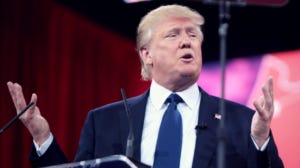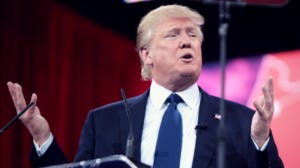In 2011, one of President Obama's advisors famously described the president's approach to the Libyan Civil War as "leading from behind." The phrase, which was intended to downplay the extent of American involvement in Middle Eastern affairs, became a favorite punchline for conservatives. They evoked it whenever the president appeared to abdicate leadership on important issues.
Columnist Charles Krauthammer even referred to the term as "The Obama Doctrine," calling it an accurate description of Obama's overall passivity on the world stage.
"To be precise, leading from behind is a style, not a doctrine," Krauthammer clarified. "Doctrines involve ideas, but since there are no discernible ones that make sense of Obama foreign policy...this will have to do."
Sure enough, President Obama didn't have many ideas outside of domestic passions like social justice and wealth redistribution. When it came to the rest of the world, he relied in large part on the value of his own grandeur. Like much of the American public, he viewed himself as a uniquely impressive figure — one of great historical significance. His charisma and his gift for connecting with people earned him huge, adoring audiences...not just in America but when he spoke abroad.
Obama seemed to think that that alone (along with George W. Bush having left the White House) would somehow translate to a more peaceful, civil world. And he clearly wasn't the only one who thought that. The media treated him like Gandhi, and he was even awarded the Nobel Peace Prize in his first year in office for no identifiable reason.
The reality is that strong branding alone isn't how successful solutions to complicated problems are created. And the world Barack Obama left behind is ample proof of that.
Unfortunately, our current president doesn't seem to have learned a whole lot from Obama's failures.
Like Obama, Trump won the presidency on his larger than life persona. The two had very different styles, but both positioned themselves as outsiders running on a platform of populist change against a status quo that only they could conquer. They connected with voters on a personal level, and their charisma outshone their opponents. The products they were primarily selling weren't policies, records of achievement, or even an identifiable set of core principles.
What they were selling was messianic awesomeness — their own.
Of course, they weren't the only successful candidates to ever employ this method, but most politicians, once they take office, don't rely on it as a governing strategy.
Obama was grossly ill-prepared to deal with global threats, believing that his personality and grand stature would miraculously turn our enemies into allies, once we receded from a position of strength and perceived arrogance on the world stage. I didn't exactly work out.
Likewise, Trump is trying to govern as president through the Trump brand, incorporating familiar instincts like bullying, demagoguing issues, trashing critics, threatening opponents, and throwing out false and reckless accusations.
He's leading from his gut (like his loyal supporters want him to), and though this approach certainly served him well on the campaign trail, it's not translating into effective leadership or positive results in our system of divided government. All it's doing is handing his detractors ammunition, making unnecessary enemies, and dragging down his own approval numbers.
Of course, the failure of the AHCA can't be blamed entirely (or even mostly) on Trump, but his 2018-primary threats against the Freedom Caucus will only make future collaborations (including on health care) more difficult. And with the pointless, politically-damaging mayhem Trump created with his Trump Towers wire-tapping accusation, Democrats (already seeing his lame-duck level approval numbers) feel more emboldened than ever to oppose anything with the president's name on it. This includes a possible filibuster of a highly qualified Supreme Court nominee.
None of this would matter if Trump could get everything done by appointment or executive order (as he's been doing in the business world his entire adult life), but that's not how things work in our system of government. And simply saying "drain the swamp" over and over again was never going to change that. The "establishment" that Trump ran so vocally against (and is now a big part of) is every bit as robust as it was before he became president, and it will remain that way. If he can't find a way to navigate through it, he won't be able to make many things happen.
Mike Allen wrote a piece on Friday, describing how Trump (according to friends and advisers) realizes that his approach thus far has flopped. If true, that's a good thing. Allen also wrote that Trump "feels baffled and paralyzed by how to fix it." That's not so good.
The other day, Justin Amash, a Michigan congressman, said something that caught my attention: "The point of principles is to help you make practical decisions when convenience compels you to make impractical ones."
I'm not sure if that was an original quote, or something Amash borrowed, but it's true. And President Trump's lack of guiding principles (and government experience) worried a lot of people during the primaries for this very reason. It may be quick and convenient to filet someone or something you see as an obstacle, but it can often be counterproductive to good decision-making.
Such concerns ultimately fell on deaf ears during the election. And while liberal-media sycophants helped preserve Obama's cult of personality and decent approval ratings (which are helpful in Washington), Trump's limited number of media-conservative cheerleaders and angry Internet loyalists aren't enough to do the same for him.
That means it's up to Trump, himself, to get his act together. But when one spends a lifetime going with his gut, that's not such an easy task.






